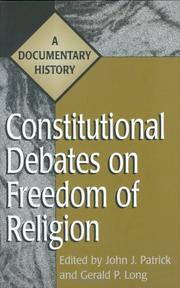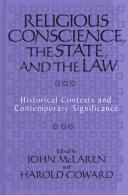| Listing 1 - 10 of 103 | << page >> |
Sort by
|
Book
ISBN: 1443866121 9781443866125 1322097283 9781322097282 Year: 2014 Publisher: Newcastle upon Tyne, England : Cambridge Scholars Publishing,
Abstract | Keywords | Export | Availability | Bookmark
 Loading...
Loading...Choose an application
- Reference Manager
- EndNote
- RefWorks (Direct export to RefWorks)
The protection of the right to freedom of thought, conscience and religion is one of the most basic tenets of a democratic society. This right is not only crucial for those who believe, but is also so for atheists, agnostics and sceptics who have no religious beliefs. It is also considered a cornerstone of a democratic society and is closely linked to pluralism, tolerance and open-mindedness. Turkey has been involved in an accession process in order to become a full member of the European Un...
Freedom of religion --- Freedom of worship --- Intolerance --- Liberty of religion --- Religious freedom --- Religious liberty --- Separation of church and state --- Freedom of expression --- Liberty --- Law and legislation
Book
Year: 2022 Publisher: Basel MDPI - Multidisciplinary Digital Publishing Institute
Abstract | Keywords | Export | Availability | Bookmark
 Loading...
Loading...Choose an application
- Reference Manager
- EndNote
- RefWorks (Direct export to RefWorks)
The Religious Freedom Institute’s FORIS project, an initiative made possible by funding from the John Templeton Foundation, proudly presents, with the assistance of MDPI, this Special Issue of Religions with a focus on the “Freedom of Religious Institutions in Society.” Its strengths lie in its global perspective, the acumen of its authors, and the wide range of subjects and complex factors addressed. This Special Issue volume consists of a series of articles written by leading religious freedom scholars and advocates, including Jonathan Fox, Roger Finke, Paul Marshall, Chad Bauman, Byron Johnson, Timothy Shah, Robert Hefner, Lihui Zhang, Rebecca Supriya Shah, Dane Mataic, Mariz Tadros, and Akram Habib. It contributes to the overall scholarship revolving around religious freedom by placing greater and well-deserved attention upon the crucial nature of institutional religious freedom and its key capacity to enable the enjoyment of religious freedom and human rights in general. Religious liberty is not an individual right alone, but rather includes the right of religious communities to gather in synagogues, churches, mosques, temples, and other houses of worship. Freedom of religion also includes the right of faith communities to establish religious institutions such as schools, hospitals, ministries to the poor, universities, and countless others that seek to embody the teachings of their respective religious traditions. Institutional religious freedom encompasses this full range of congregational and organizational expressions of religious faith.
Religious freedom --- religious institutions --- human rights --- religious freedom --- rights --- institutions --- organizations --- for profit --- jurisdiction --- vocation --- Hindu --- Christian --- law --- restriction --- religion --- India --- minority --- majority --- legal --- regulation --- temples --- churches --- mosques --- freedom --- volunteerism --- prosocial --- crime --- positive criminology --- desistance --- identity transformation --- rehabilitation --- religious liberty --- religious organizations --- institutional religious freedom --- religious autonomy --- church autonomy --- freedom of the church --- W. Cole Durham, Jr. --- Indonesia --- religion in law --- citizenship --- institutional religious restrictions --- international human rights organizations --- religious restrictions --- Erastianism --- secularism --- Jawaharlal Nehru --- Hinduism --- Hindu nationalism --- culture --- economy --- human flourishing --- religion institution --- education --- pandemic --- COVID-19 --- minorities --- discriminaiton --- Copts --- equal citizenship --- Coptic movements --- Egypt
Book
ISBN: 9780674724754 0674724755 0674730135 0674730968 9780674730137 Year: 2014 Publisher: Cambridge, MA
Abstract | Keywords | Export | Availability | Bookmark
 Loading...
Loading...Choose an application
- Reference Manager
- EndNote
- RefWorks (Direct export to RefWorks)
Familiar accounts of religious freedom in the United States often tell a story of visionary founders who broke from centuries-old patterns of Christendom to establish a political arrangement committed to secular and religiously neutral government. These novel commitments were supposedly embodied in the religion clauses of the First Amendment. But this story is largely a fairytale, Steven Smith says in this incisive examination of a much-mythologized subject. The American achievement was not a rejection of Christian commitments but a retrieval of classic Christian ideals of freedom of the church and of conscience. Smith maintains that the First Amendment was intended merely to preserve the political status quo in matters of religion. America's distinctive contribution was, rather, a commitment to open contestation between secularist and providentialist understandings of the nation which evolved over the nineteenth century. In the twentieth century, far from vindicating constitutional principles, as conventional wisdom suggests, the Supreme Court imposed secular neutrality, which effectively repudiated this commitment to open contestation. Instead of upholding what was distinctively American and constitutional, these decisions subverted it. The negative consequences are visible today in the incoherence of religion clause jurisprudence and the intense culture wars in American politics.
Freedom of religion --- Church and state --- Liberté religieuse --- Eglise et Etat --- Church and state -- United States. --- Freedom of religion -- United States. --- Constitutional Law - U.S. --- United States --- American religious freedom --- Christian-Paganism --- the First Amendment --- religion
Book
ISBN: 0190454326 019026019X 019997828X 9780199978281 9780190260194 9780199975907 0199975906 Year: 2013 Publisher: Oxford New York Oxford University Press
Abstract | Keywords | Export | Availability | Bookmark
 Loading...
Loading...Choose an application
- Reference Manager
- EndNote
- RefWorks (Direct export to RefWorks)
Although many books on terrorism and religious extremism have been published in the years since 9/11, none of them written by Western authors call for the curtailment of religious freedom and freedom of expression for the sake of greater security. Issues like torture, domestic surveillance, and unlawful detentions have dominated the literature in this area, but few, if any, major scholars have questioned the vast allowances made by Western nations for the freedoms of religion and speech. Freedom from Religion challenges the almost sacrosanct inviolability of these two civil liberties. By drawi
Freedom of religion. --- Freedom of religion --- Freedom of worship --- Intolerance --- Liberty of religion --- Religious freedom --- Religious liberty --- Separation of church and state --- Freedom of expression --- Liberty --- Law and legislation

ISBN: 0313301409 9781567508833 1567508839 9780313301407 Year: 1999 Publisher: Westport, Conn. Greenwood Press
Abstract | Keywords | Export | Availability | Bookmark
 Loading...
Loading...Choose an application
- Reference Manager
- EndNote
- RefWorks (Direct export to RefWorks)
Traces the history and development of the debate over the separation of religion and government in the United States through a collection of primary documents.
Freedom of religion --- United States --- History --- Sources --- Freedom of worship --- Intolerance --- Liberty of religion --- Religious freedom --- Religious liberty --- Separation of church and state --- Freedom of expression --- Liberty --- Law and legislation --- History.

ISBN: 0585059993 9780585059990 079144001X 0791440028 1438412541 Year: 1999 Publisher: Albany : State University of New York Press,
Abstract | Keywords | Export | Availability | Bookmark
 Loading...
Loading...Choose an application
- Reference Manager
- EndNote
- RefWorks (Direct export to RefWorks)
Freedom of religion --- Freedom of worship --- Intolerance --- Liberty of religion --- Religious freedom --- Religious liberty --- Separation of church and state --- Freedom of expression --- Liberty --- Law and legislation --- United States --- Canada
Book
ISBN: 0674728041 0674728033 9780674728035 9780674726826 0674726820 Year: 2013 Publisher: Cambridge, Massachusetts
Abstract | Keywords | Export | Availability | Bookmark
 Loading...
Loading...Choose an application
- Reference Manager
- EndNote
- RefWorks (Direct export to RefWorks)
Religion --- Atheism. --- Freedom of religion. --- Philosophy --- Agnosticism --- Free thought --- Irreligion --- Secularism --- Theism --- Freedom of religion --- Freedom of worship --- Intolerance --- Liberty of religion --- Religious freedom --- Religious liberty --- Separation of church and state --- Freedom of expression --- Liberty --- Philosophy. --- Law and legislation
Book
ISBN: 1442208295 9781442208292 1299712983 9781299712980 9781442208278 1442208279 Year: 2013 Publisher: Lanham
Abstract | Keywords | Export | Availability | Bookmark
 Loading...
Loading...Choose an application
- Reference Manager
- EndNote
- RefWorks (Direct export to RefWorks)
Throughout American history, legal battles concerning the First Amendment's protection of religious liberty have been among the most contentious issue of the rights guaranteed by the United States Constitution. Religious Liberty and the American Supreme Court: The Essential Cases and Documents represents the most authoritative and up-to-date overview of the landmark cases that have defined religious freedom in America.
Freedom of religion --- Church and state --- Christianity and state --- Separation of church and state --- State and church --- State, The --- Freedom of worship --- Intolerance --- Liberty of religion --- Religious freedom --- Religious liberty --- Freedom of expression --- Liberty --- Law and legislation
Periodical
ISSN: 27900762 20705484
Abstract | Keywords | Export | Availability | Bookmark
 Loading...
Loading...Choose an application
- Reference Manager
- EndNote
- RefWorks (Direct export to RefWorks)
Freedom of religion --- Freedom of worship --- Intolerance --- Liberty of religion --- Religious freedom --- Religious liberty --- Separation of church and state --- Freedom of expression --- Liberty --- Law and legislation --- Freedom of religion. --- Liberté religieuse
Book
ISBN: 9781644697405 Year: 2022 Publisher: Boston, MA
Abstract | Keywords | Export | Availability | Bookmark
 Loading...
Loading...Choose an application
- Reference Manager
- EndNote
- RefWorks (Direct export to RefWorks)
This diverse collectionof essays explore the unique history of Jews inAmerica and the various ways in which they have definedtheir identities both as Americans and as Jews. The topics ofthe essays range from sports and business to religion andbusiness.
Jews --- Judaism --- HISTORY / Jewish. --- Religions --- Semites --- Hebrews --- Israelites --- Jewish people --- Jewry --- Judaic people --- Judaists --- Ethnology --- Religious adherents --- History --- Religion --- Conservative. --- Holocaust. --- Jewish identity. --- Orthodox Judaism. --- United States. --- World War II. --- antisemitism. --- athletes. --- business. --- diaspora. --- ethnicity. --- historiography. --- moguls. --- religious freedom. --- secular.
| Listing 1 - 10 of 103 | << page >> |
Sort by
|

 Search
Search Feedback
Feedback About UniCat
About UniCat  Help
Help News
News